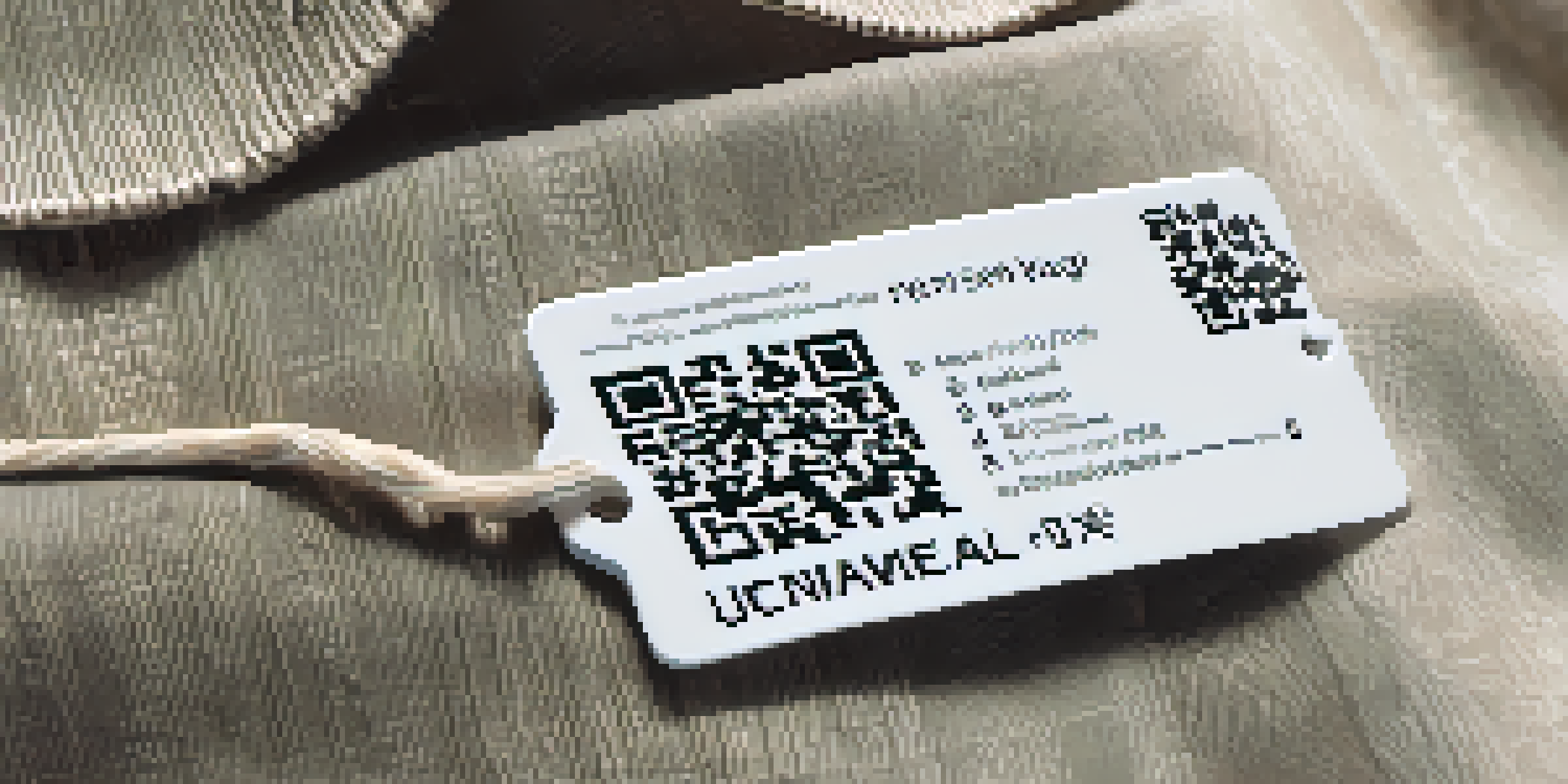Blockchain in Fashion: Enhancing Transparency and Ethics

Understanding Blockchain and Its Role in Fashion
Blockchain is a digital ledger technology that securely records transactions across multiple computers. In the fashion industry, it allows brands to trace the journey of their products from source to consumer. This traceability can foster greater trust between consumers and brands, as customers increasingly seek transparency regarding the origins of their clothing.
Blockchain technology is a powerful tool for enhancing transparency and trust in the fashion industry, allowing consumers to make informed choices about what they wear.
By utilizing blockchain, fashion companies can verify the authenticity of materials and ensure ethical sourcing. For instance, a luxury brand can prove that its cashmere comes from sustainably managed farms. This not only enhances brand credibility but also aligns with the growing consumer demand for responsible fashion.
Moreover, the decentralized nature of blockchain minimizes the risk of data tampering. When companies update the status of their products, that information is permanently recorded and accessible to all stakeholders. This level of transparency can empower consumers to make informed choices, knowing they are supporting ethical practices.
Promoting Ethical Supply Chains with Blockchain
One of the significant challenges in the fashion industry is ensuring ethical labor practices throughout the supply chain. Blockchain technology can help by providing a transparent record of each step in the production process. This way, brands can verify that their suppliers adhere to labor laws and ethical standards.

For example, a clothing company could use blockchain to track the working conditions of factory workers. If a brand discovers that a supplier is violating labor rights, it can take immediate action to address the issue. This proactive transparency not only protects workers but also strengthens the brand's reputation.
Blockchain Enhances Fashion Transparency
Blockchain technology allows fashion brands to provide verifiable information about their products, fostering trust and consumer confidence.
As more consumers prioritize ethical purchasing, brands that leverage blockchain for supply chain transparency can differentiate themselves. This commitment to ethical practices can lead to increased customer loyalty and a stronger brand image in a competitive market.
Enhancing Consumer Trust Through Transparency
Today’s consumers are more informed than ever and desire transparency from the brands they support. Blockchain offers a way for fashion companies to meet this expectation by providing verifiable information about their products. When consumers can access detailed histories of their clothing items, they feel more confident in their purchasing decisions.
The future of fashion lies in sustainability and accountability, and blockchain provides the framework to achieve these goals.
For instance, apps and websites can allow users to scan a QR code on a garment, revealing its complete production journey. This feature can include details about the materials used, manufacturing processes, and even the story behind the artisans involved. Such transparency can effectively build trust and foster a deeper connection between consumers and brands.
Ultimately, when consumers trust a brand, they are more likely to remain loyal and become advocates for it. This relationship can lead to positive word-of-mouth marketing, which is invaluable in the fashion industry, where reputation is everything.
Sustainable Fashion: A Natural Fit for Blockchain
Sustainability is a growing concern in the fashion industry, and blockchain can play a pivotal role in promoting sustainable practices. By using blockchain technology, brands can track the environmental impact of their materials and processes. This allows them to make more informed decisions that align with sustainability goals.
For example, a company might implement blockchain to verify the eco-friendliness of its fabrics, ensuring they are sourced from sustainable farms. Such transparency not only supports ethical sourcing but can also help brands reduce their carbon footprint. This commitment to sustainability can resonate with consumers who prioritize eco-friendly choices.
Promoting Ethical Supply Chains
By tracking every step of the production process, blockchain helps ensure ethical labor practices and strengthens brand reputations.
In essence, blockchain empowers fashion brands to be accountable for their environmental impact. By providing clear, accessible information about sustainability efforts, brands can attract eco-conscious consumers and contribute to a more sustainable future for the industry.
Combating Counterfeiting with Blockchain Technology
Counterfeiting is a significant issue in the fashion world, resulting in lost revenue and damaged brand reputations. Blockchain technology offers a solution by providing a secure method for verifying product authenticity. Each item can be assigned a unique digital identity recorded on the blockchain, making it nearly impossible to forge.
For instance, luxury brands can create digital certificates of authenticity for their products, accessible through blockchain. This means that consumers can verify that what they are purchasing is genuine, not a cheap knockoff. Such measures can help protect both the brand's integrity and the consumers' investments.
By effectively combating counterfeiting, blockchain technology can enhance consumer confidence and secure brands’ market positions. This not only helps in preserving brand value but also boosts overall industry health by ensuring that authentic products are available.
Challenges of Implementing Blockchain in Fashion
While the potential of blockchain in fashion is immense, there are challenges to consider in its implementation. One major hurdle is the need for widespread industry cooperation; without collaboration, the effectiveness of blockchain can be limited. Brands must be willing to share data and work together to create a comprehensive system that benefits everyone.
Additionally, the technology itself can be complex, and many fashion companies may not have the technical expertise to integrate blockchain into their operations. This can lead to hesitancy in adoption, especially among smaller brands with limited resources. Education and training will be essential for overcoming these barriers.
Combating Counterfeiting Effectively
Blockchain offers a secure method for verifying product authenticity, significantly reducing the risk of counterfeiting in the fashion industry.
Finally, consumer awareness of blockchain technology is still low. For blockchain to be truly effective in fashion, consumers need to understand its benefits and how to access the information it provides. Brands that take the initiative to educate their customers about blockchain can create a more informed market and drive adoption.
The Future of Fashion: A Blockchain-Enabled Landscape
As the fashion industry continues to evolve, blockchain is poised to become an integral part of its future. With the increasing demand for transparency, ethical practices, and sustainability, brands that embrace blockchain technology will likely lead the way. This shift can revolutionize how consumers engage with fashion, promoting a more informed and responsible marketplace.
Moreover, as technology advances, we can expect more innovative applications of blockchain in fashion. From smart contracts that automate transactions to new ways of engaging consumers through digital identities, the possibilities are endless. The future of fashion may very well be defined by the principles of transparency and accountability.

In conclusion, blockchain has the potential to reshape the fashion landscape for the better. By enhancing transparency and promoting ethical practices, it can create a more sustainable, trustworthy, and innovative industry that benefits everyone involved—from producers to consumers.